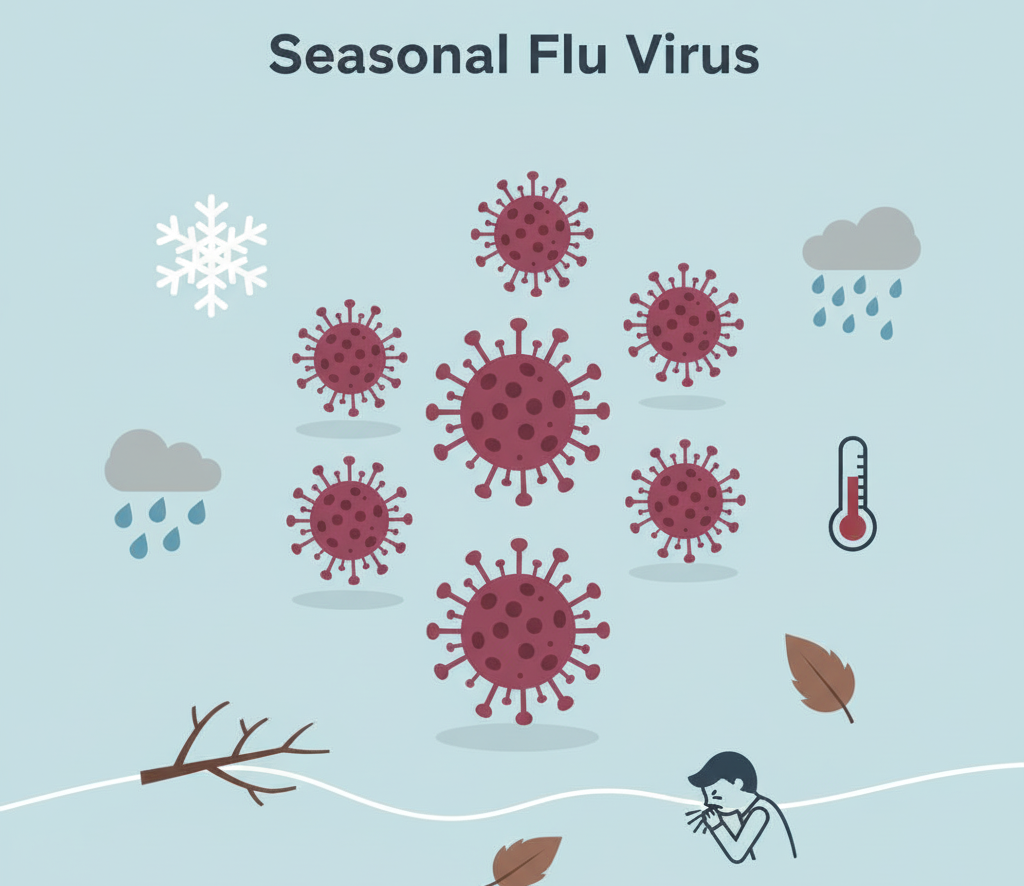Introduction
Flu season brings a rise in viral infections, fever, sore throat, body aches, and fatigue. While medicines help control symptoms, your food choices play a huge role in how your body fights infections and how quickly you recover. A strong immune system depends on good nutrition — and certain foods can help the body respond better to flu viruses, reduce inflammation, hydrate tissues, and support faster healing.
This blog explains the best foods to eat during flu season, the foods to avoid, how nutrition boosts immunity, and how diet can support recovery from flu-like illnesses. The information is written in simple, patient-friendly language for Indian readers.

Understanding Flu Season
Flu season refers to the period when cases of influenza and viral fever rise — often during:
-
Seasonal changes
-
Winter months
-
Monsoon transition
-
Times of high air pollution
-
Periods of low sunlight exposure
Viruses spread easily in crowded places, closed environments, and through contaminated surfaces. Stress, poor sleep, and poor diet weaken immunity, making people more vulnerable.
Why Food Matters During Flu Season
Food can:
-
Boost immune response
-
Reduce inflammation
-
Support gut health
-
Hydrate the body
-
Provide vitamins and minerals
-
Speed up tissue repair
-
Reduce complications
Certain nutrients — like vitamin C, zinc, antioxidants, and protein — are especially important.
ALSO READ: Kidney Health: Scientists Finally Found A 'simple' Way To Reverse Kidney Damage — When Is The Cure Coming?
Foods to Eat During Flu Season
1. Warm Soups and Broths
Clear vegetable soup, chicken soup, dal soups, and bone broth support hydration and soothe the throat. Warm liquids clear mucus and deliver easy-to-digest nutrients.
2. Citrus Fruits
Oranges, mosambi, lemons, kiwi, and amla are rich in vitamin C, which strengthens immune response and reduces illness duration.
3. Ginger and Tulsi
Ginger reduces inflammation and helps with sore throat. Tulsi supports immunity and eases congestion.
4. Garlic
Garlic has natural antiviral and antibacterial properties. Adding raw or cooked garlic to meals boosts immunity.
5. Turmeric Milk (Haldi Doodh)
Curcumin in turmeric reduces inflammation and supports healing.
6. Bananas
Easy to digest and rich in potassium, bananas help with weakness and dehydration.
7. Yogurt and Probiotics
Curd, buttermilk, and probiotic drinks support gut health, which is directly linked to immunity.
8. Vegetables
Spinach, carrots, tomatoes, broccoli, beetroot, and pumpkin provide antioxidants and vitamins.
9. Eggs and Protein-Rich Foods
Protein repairs tissues and strengthens immunity. Eggs, dal, paneer, tofu, and fish are excellent options.
10. Warm Herbal Teas
Ginger tea, tulsi tea, chamomile, and cinnamon tea soothe the throat and reduce inflammation.
Foods to Avoid During Flu Season
-
Fried foods
-
Sugary snacks
-
Ice-cold drinks
-
Excessive caffeine
-
Packaged junk foods
-
Heavy dairy products if congested
-
Spicy foods that irritate the throat
-
Fatty foods that slow digestion
These can worsen inflammation or weaken immunity.
Hydration for Faster Recovery
Hydration is essential during flu because fever causes fluid loss.
Good hydration options:
-
Warm water
-
Coconut water
-
ORS
-
Soups
-
Herbal teas
-
Lemon honey water
Avoid sugary drinks and sodas.
How Nutrition Boosts Immunity
Immunity-supporting nutrients include:
-
Vitamin C – citrus fruits, amla
-
Vitamin A – carrots, spinach
-
Zinc – nuts, seeds, legumes
-
Protein – eggs, dal, pulses
-
Antioxidants – berries, vegetables
-
Probiotics – curd, fermented foods
Eating a balanced diet ensures your body has the tools to fight viruses.
Lifestyle Tips for Flu Season
-
Wash hands frequently
-
Maintain sleep routine
-
Exercise regularly
-
Spend 15 minutes in sunlight
-
Avoid touching your face
-
Wear masks in crowded areas
-
Keep separate towels/utensils when sick
Combined with proper diet, these habits reduce flu risk significantly.

When to See a Doctor
Seek medical help if:
-
Fever lasts more than 3 days
-
Difficulty breathing
-
Severe throat pain
-
Chest pain
-
Persistent vomiting
-
High fever above 103°F
-
Blue lips or nails
-
Severe dehydration
-
Symptoms worsen suddenly
Children, elderly people, pregnant women, and those with chronic illnesses should be extra cautious.
Risks and Complications of Flu
If not treated well, flu can lead to:
-
Pneumonia
-
Sinus infections
-
Ear infections
-
Asthma flare-ups
-
Severe dehydration
-
Worsening of existing illnesses
Proper nutrition and early care reduce complication risk.
50 FAQs on Food and Flu Season
-
What should I eat during flu season?
Warm soups, citrus fruits, garlic, ginger, eggs, and vegetables. -
Can food really help prevent flu?
Yes, immunity-supportive foods make the body stronger. -
What drinks help during flu?
Warm water, herbal teas, ORS, coconut water. -
Is citrus good for flu?
Yes, vitamin C reduces illness duration. -
Should I avoid cold drinks?
Yes, they may worsen congestion. -
Are eggs good during flu?
Yes, they provide protein for recovery. -
Can I drink milk during flu?
Warm milk is fine unless you feel congested. -
Is turmeric milk good for flu?
Yes, it reduces inflammation. -
What fruits are best during flu?
Oranges, amla, banana, apple, kiwi. -
Can spicy food worsen flu?
Sometimes it irritates the throat. -
Is ginger good for flu?
Yes, it reduces cough and sore throat. -
Is garlic antiviral?
Garlic has natural antiviral properties. -
Can I drink tea during flu?
Yes, warm herbal teas help. -
Is honey good for flu?
Yes, it soothes the throat. -
What foods should I avoid?
Fried foods, sugary snacks, junk foods. -
Do vitamin supplements help?
They can help if recommended by a doctor. -
Is curd good during flu?
Yes, especially for gut immunity. -
Can children eat citrus during flu?
Yes, unless they have acidity issues. -
Is chicken soup effective?
Yes, it's hydrating and soothing. -
Does sugar weaken immunity?
Yes, excessive sugar slows immune function. -
Should I eat more protein?
Yes, it supports healing. -
Is it okay to eat rice during flu?
Yes, rice is easy to digest. -
Can dehydration worsen flu?
Yes, it increases weakness. -
Is ORS useful during flu?
Yes, it helps maintain hydration. -
Can hot water reduce flu symptoms?
It soothes throat and dissolves mucus. -
Is apple good during flu?
Yes, it is easy to digest. -
Are nuts good for flu?
Yes, they provide zinc and healthy fats. -
Is fast food harmful during flu?
Yes, it slows recovery. -
Should I avoid dairy completely?
Only if it worsens congestion. -
Is chapati or rice better?
Both are fine, choose what digests easily. -
Can I drink coffee?
Limited coffee is okay, but excess dehydrates. -
Do supplements replace healthy food?
No, real food is still essential. -
Are bananas helpful?
Yes, they improve hydration and energy. -
Can I eat oily foods?
Avoid them during flu. -
What breakfast is ideal?
Upma, porridge, eggs, poha, or idli. -
Is soup good in the morning?
Yes, it hydrates and nourishes. -
Does chicken increase mucus?
No, chicken is fine. -
Can flu patients eat dry fruits?
Yes, in small quantities. -
Is sunlight good during flu?
Yes, for vitamin D and immunity. -
Can flu affect appetite?
Yes, loss of appetite is common. -
Should I force myself to eat?
Eat small, frequent meals. -
Can flu cause dehydration?
Yes, due to fever and sweating. -
Does hot soup break fever?
It helps, but doesn’t replace medicine. -
Can I eat spicy pickles?
Avoid them during flu. -
Is idli good for flu?
Yes, it's soft and easy to digest. -
Are probiotics necessary?
They support gut immunity. -
Can I drink juices?
Fresh juices are fine; avoid packaged ones. -
Is poha good during flu?
Yes, it's light and nutritious. -
Can flu patients eat sweets?
Avoid excessive sweets. -
Do vitamins speed recovery?
They help but should be taken with food.
Conclusion
Food plays a powerful role in strengthening immunity and supporting recovery during flu season. The right diet can reduce inflammation, hydrate your body, soothe symptoms, and help you heal faster. Pairing good nutrition with proper rest, hygiene, and medical guidance ensures a safer and healthier flu season.
Quickobook CTA
Feeling sick?
Book a doctor instantly on Quickobook
Video consultations & in-clinic visits available
Fast access to general physicians & pediatricians
Disclaimer
This blog is for educational purposes only. Always consult a doctor for diagnosis and treatment.









Comments (0)
No comments yet. Be the first to share your thoughts!
Leave a Comment